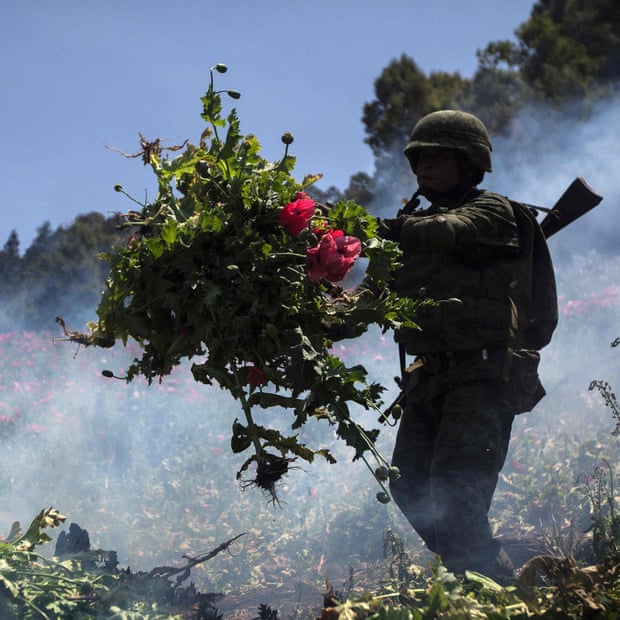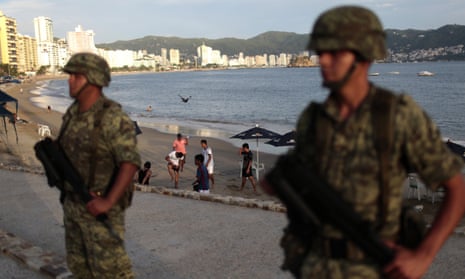Mexico’s senate has approved controversial legislation enshrining the role of the military in law enforcement, despite soaring violence and repeated allegations that the country’s security forces have committed human rights abuses.
Lawmakers pushed through the “interior security law” early on Friday amid heavy security to stop protesters who allege the measure will militarise the country and cement a failed strategy of using soldiers to combat drug cartels.
The bill now returns to the lower house of congress, where its passage is expected to be a formality.
Quick GuideMexico's war on drugs
Show

Why did Mexico launch its war on drugs?
On 10 December 2006, Felipe Calderón launched Mexico’s war on drugs by sending 6,500 troops into his home state of Michoacán, where rival cartels were engaged in tit-for-tat massacres.
Calderón declared war eight days after taking power – a move widely seen as an attempt to boost his own legitimacy after a bitterly contested election victory. Within two months, around 20,000 troops were involved in operations.
What has the war cost so far?
The US has donated at least $1.5bn through the Merida Initiative since 2008, while Mexico spent at least $54bn on security and defence between 2007 and 2016. Critics say that this influx of cash has helped create an opaque security industry open to corruption.
But the biggest costs have been human: since 2007, over 250,000 people have been murdered, more than 40,000 reported as disappeared and 26,000 unidentified bodies in morgues across the country. Human rights groups have also detailed a vast rise in human rights abuses including torture, extrajudicial killings and forced disappearances by state security forces.
Peña Nieto claimed to have killed or detained 110 of 122 of his government's most wanted narcos. But his biggest victory – and most embarrassing blunder – was the recapture, escape, another recapture and extradition of Joaquín “El Chapo” Guzmán, leader of the Sinaloa cartel.
Mexico’s decade-long war on drugs would never have been possible without the injection of American cash and military cooperation under the Merida Initiative. The funds have continued to flow despite indisputable evidence of human rights violations.
Under new president Andrés Manuel López Obrador, murder rates are up and a new security force, the Civil Guard, is being deployed onto the streets despite campaign promises to end the drug war.
What has been achieved?
Improved collaboration between the US and Mexico has resulted in numerous high-profile arrests and drug busts. Officials say 25 of the 37 drug traffickers on Calderón’s most-wanted list have been jailed, extradited to the US or killed, although not all of these actions have been independently corroborated.
The biggest victory – and most embarrassing blunder – under Peña Nieto’s leadership was the recapture, escape and another recapture of Joaquín “El Chapo” Guzmán, leader of the Sinaloa cartel.
While the crackdown and capture of kingpins has won praise from the media and US, it has done little to reduce the violence.
Human rights organisations have also warned that the law could turn over public security and policing duties to untrained soldiers under the command of unaccountable army brass, while reducing civilian oversight and relegating human rights to an afterthought.
“We are concerned that the bill gives the armed forces a leadership and coordination role in certain circumstances, rather than limiting their role to aiding and assisting civilian authorities,” said a statement issued by the UN high commissioner for human rights.
“[It] does this in the absence of solid control mechanisms to ensure that operations are carried out with full respect for human rights.”
Shortly after taking office in December 2006, then president Felipe Calderón announced a crackdown on drug cartels, deploying troops in his home state of Michoacán and then across the country. More than a decade later, soldiers still patrol the streets, but violence has soared, the rule of law remains elusive and corrupt police forces still operate with widespread incompetence.
The law arrives as Mexico suffers its most murderous year on record in 2017. The country registered 2,371 homicides in October, more than any month since 1997.
It also comes as campaigning starts for presidential elections scheduled for 1 July next year, which are expected to be contentious and close.
Critics say the law could be abused easily for political purposes, while others working in human rights warn the law allows soldiers to stop peaceful protests.
“What this law does is that under the pretext of giving legal certainty to the military … would allow the president to use the armed forces in a way that isn’t entirely excluded the possibility of they intervene in protests that are not peaceful,” said Santiago Aguirre of the Miguel Agustín Pro Juárez Human Rights Centre.
“What worries us is the determination of when a protest is peaceful or not will rest with the military.”
The law proposes classifying internal security as a matter of national defence, allowing information on army operations to be classified as secret. It also permits the president to deploy soldiers for operations of up to one year, but which can be extended for as many times is deemed necessary.
“This will provide absolutely no incentive to improve the police,” Aguirre said of the law.
Supporters of the legislation insist the new law establishes rules for deploying the armed forces, while providing incentives for local politicians to improve police forces and stop pawning off responsibility for security on soldiers. They also point to requirements for the president to explain military deployments.
“Nobody’s proposing a blank cheque with which the armed forces do whatever they want,” said Roberto Gil, a senator with the conservative National Action party. “To the contrary, the law says if the armed forces are needed, a procedure will have to be followed, whereby it’s made clear the reason why, the time requires and the objectives of the intervention.”
Mexico’s military has long agitated for laws to regulate its role in providing security measures such as operating checkpoints, raiding drug-cartel dens and detaining suspects. It has also expressed some resentment over a spate of accusations of human rights abuses – such as a 2014 massacre of suspects in a town known as Tlatlaya.
A report from the Washington Office on Latin America, a human rights thinktank, found barely 3% of the cases into army abuses opened by the attorney general’s office resulted in convictions.
Defence secretary Gen Salvador Cienfuegos insisted last year that none of his personnel “were trained to pursue criminals” and that soldiers would rather return to their barracks.
Observers say that there is an element of truth in that, but also point out that the defence ministry has seen its political clout increase and budgets bulge over the past decade.
“They don’t want to be in the streets, but they see this (situation) as an ideal platform to expand and modernise,” said Jorge Medellín, a journalist covering Mexican military matters.
